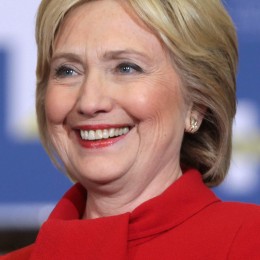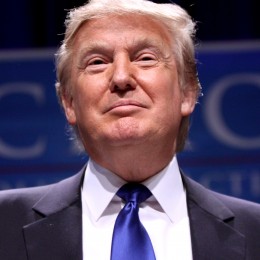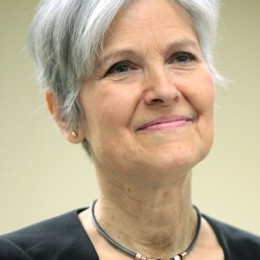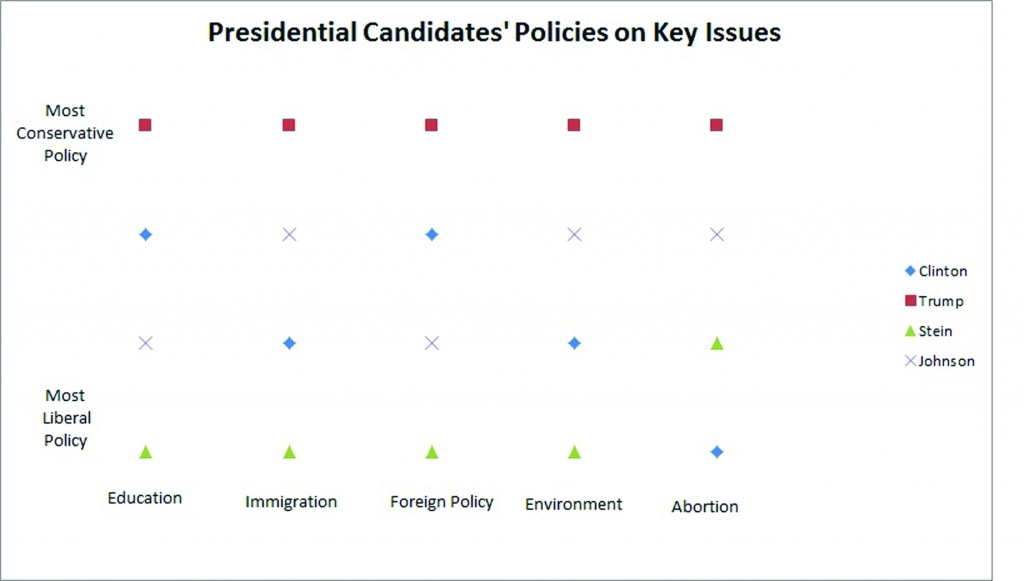Hilary Clinton
Democratic Nominee
by Billy Faulkner

Hillary Diane Rodham Clinton is the Democratic nominee for the U.S. presidency. She is the very first female candidate to be nominated for president by a major U.S. political party. She is also the first former First Lady to run for president.
Clinton was born in Chicago on Oct. 26, 1947. She was raised with her two brothers in the small town of Park Ridge, Ill. She graduated from Wellesley College with a Bachelor of Arts in Political Science. In 1971 she enrolled at Yale Law School where she met Bill Clinton, who would later serve as President of the United States from 1993 to 2001. Bill and Hillary were married in 1975. Hillary Clinton stood steadfast beside her husband when he admitted his infidelity with then-intern Monica Lewinsky, and during his later impeachment. In 2000, Clinton was elected as the first female senator from New York. She was reelected in 2006 and ran for president in 2008. Barack Obama won the election and made Clinton Secretary of State, a position in which she served from 2009 to 2013.
She wants to expand on Obama’s policies regarding immigration status of long-term undocumented residents of the U.S. She has called for comprehensive immigration reform that will include a means for undocumented peoples to obtain permanent legal residency, and therefore, U.S. citizenship.
Clinton has argued that her tireless globetrotting in her four years as Secretary of State rescued the U.S. from the diplomatic pit the country had dug for itself with the Iraq invasion and the unilateral spirit of the George W. Bush administration. Clinton supports a continued U.S. military presence in Afghanistan. She has also supported military action in Libya and Syria. However, interviews with former aides, senior officials and her foreign counterparts paint a complex picture of Clinton the diplomat that defies easy categorization as “war hawk.” She opposes the Central American Free Trade Agreement, saying,“We have to trade with the rest of the world. But we have failed to provide the basic safety net support that American workers need.” Clinton’s proposed economic policies involve addressing income inequality through increased taxes on the wealthy. She has called for a four-percent surtax on incomes over $5 million, as well as the closing of “tax loopholes” for the wealthy. According to BBC, she has also called for “higher tax breaks for health care and education spending for middle class families.” Clinton wants to create jobs by investing in advanced manufacturing and renewable energy and by increasing employment training. Clinton believes this will produce 10 million new jobs.
Clinton also seeks to expand and protect LGBTQ and women’s rights, and institute family support through paid parental leave and universal preschool for toddlers. Clinton opposes state-legislated increases of regulations on abortion providers, including banning abortions after 20 weeks of pregnancy. She has also spoken out against mass incarceration and mandatory minimum sentences, as well as issues of racial bias in police departments.
Clinton has been criticized for her actions during the 2012 attack on the U.S. Embassy in Benghazi (she allegedly declined the request for tighter security), and her usage of a private email server to carry out classified government work.
Sources: The Atlantic, BBC, The Guardian, HillaryClinton.com, The New York Times
Donald Trump
Republican Nominee
by Kelsey Fiander-Carr

Republican presidential nominee Donald Trump became a celebrity as the host of “The Apprentice,” but apart from the television realm, Trump’s business is real estate–most notably, building luxury hotels across the U.S., from Chicago to Los Angeles.
In terms of immigration, Trump has made it clear that if he were elected president he would build a wall separating the United States and Mexico, and he has suggested that Mexico is sending rapists, drug traffickers and other criminals into the U.S. Trump not only wants to prevent illegal entry into the U.S., but also wants to end illegal aliens’ residency in the states if they have already successfully left their home country. Trump does not want illegal immigrants to be granted leniency and believes they should be automatically deported from the nation.
Along with the planned deportation of illegal aliens from Mexico, Trump has proposed to ban Muslim immigrants from entering the U.S. if they come from a country with connections to terrorist groups. Trump hopes to eliminate the extreme terrorist group ISIS as soon as he enters office and would like to send troops into affected areas in addition to bombing areas that are known to be controlled by ISIS.
Trump is generally opposed to gun control, although he supports improving the background check system. He has suggested that many of the mass shootings in the country could have been stopped if there were more people carrying weapons.
In his proposed economic plan, Trump would cut government spending, reduce income taxes for all sectors, reduce taxes for corporate businesses and eliminate the estate tax. Because of the cuts, the top earning salaries in the U.S. would see an increase in profit over the next year. In doing this, Trump believes that the tax cuts would boost the economy and create 25 million jobs over 10 years. Most of the jobs would be generated with the investment in the infrastructure business.
Trump believes that the U.S. should be run on a more free market system, and would change the way the U.S. trades and provides health care. Trump is opposed to the Affordable Healthcare Act (Obamacare) and many of the policies that are set up among the cross-national trading unions, including agreements such as the North American Free Trade Agreement and the Trans-Pacific Partnership.
Early on in his campaign, Trump declared that abortion should be illegal, except in cases of rape, incest and life of the mother. Later, Trump stated that the laws regarding abortion should be decided by each state. If a mother does decide to have a baby, Trump believes that she should be allotted six weeks of paid maternity leave. After the legalization of same-sex marriage across the U.S. in 2015, Trump stated that the institution of marriage should be left up to the states. He supports the hiring of a U.S. Supreme Court judge who would likely change the ruling on marriage equality. In recent months, Trump has come under criticism after a leaked video from 2005 revealed him saying, “I’m automatically attracted to beautiful women. I just start kissing them, like a magnet. Just kiss. I don’t even wait. When you’re a star they let you do it. You can do anything, grab them by the p—-.” Trump has since apologized, saying he was wrong.
Sources: BBC, DonaldJTrump.com, The New York Times, The Washington Post
Jill Stein
Green Party Nominee
by Gaelan Campbell
 Creative Commons/ The Waltonian Jill Stein believes that “It is essential that the option of a safe, legal abortion remains available.”
Creative Commons/ The Waltonian Jill Stein believes that “It is essential that the option of a safe, legal abortion remains available.”
Voters in the 2016 presidential election will see Jill Stein, who ran for president in 2012, return to the Green Party ticket. Born in Chicago, Stein graduated from Harvard University in 1973 and Harvard Medical School in 1979. She practiced as a physician for almost 20 years before she became interested in activism. This interest sparked from a concern with the connection between public health and the environment. During her early years as an activist, she fought primarily against environmental issues, racial injustice and campaign finance reform. She championed movements that prioritized cleaning up toxic waste sites and coal plants in Massachusetts before finally setting her eyes on a political career.
She first ran for governor of Massachusetts in 2002, finishing third. She then ran for Massachusetts House of Representatives and Secretary of the Commonwealth in 2004 and 2006, respectively. After a series of unsuccessful runs, she became representative for the Lexington, Mass. town hall for two consecutive terms.
She left office to run for governor again in 2010, but to no avail. Between elections, she made a few notable appearances with activist group Occupy Wall Street. In 2012, she ran for president of the United States against Barack Obama and Mitt Romney, receiving 0.4 percent of the vote nationally and around 1.3 percent in certain states. During her run for the 2016 candidacy, she has made time for activism. She protested the Dakota Access Pipeline with the Standing Rock Sioux tribe, provoking a warrant for her arrest after spray-painting bulldozers at the site.
In keeping with the Green Party’s emphasis on environmental protection, Jill Stein’s policies include what has been called the “Green New Deal.” This plan includes mobilization against climate change by moving towards 100 percent clean energy by 2030, protecting public parks and working on “phasing out” fossil fuels. Stein is hopeful that this will create millions of new jobs in renewable energy.
When it comes to jobs and the economy, Stein supports labor unions and wants to push job programs in areas such as mass transit. She opposes NAFTA and wants to replace it with trade deals that protect American workers. She will push to repeal “right to work” laws and promote a “living wage.” Stein wants to provide free universal child care and end poverty by making food, water, housing and utilities a right of every citizen. She will create a national $15 minimum wage and break up banks that are “too big to fail.” Health care and higher education would be a human right under Jill Stein, and she proposes forgiving all student debt. She will raise taxes on the wealthy,and cut taxes for the middle class and the poor.
Stein also wants to close military bases in countries we are allies with, cut military spending by 50 percent and demilitarize the police. She wants to end the War on Drugs and repeal the Patriot Act. Her platform also includes global nuclear disarmament. A Stein administration would be non-interventionist. She also hopes to create a path to citizenship for undocumented Americans. Her policies emphasize peace and economic justice. From her first days in the political world as an environmental activist, Jill Stein has come a long way. She hopes the country will vote for what she calls a “real progressive agenda” in November.
Sources: firedoglake.com, GP.org, Jill2016.com
Gary Johnson
Libertarian Nominee
by Madeline Harris

employment.”
Gary Johnson, originally from North Dakota, served as the governor of New Mexico for two terms before making his debut as a presidential candidate in 2012, running for the Republican primary. Many believe that Johnson’s presence in New Mexico was largely beneficial. While serving as the governor of New Mexico, Johnson cut taxes a total of 14 times, leaving the state with a billion-dollar surplus. This year, Johnson is running as a third party, libertarian candidate.
Johnson believes that addressing the national debt crisis needs to be a top priority, stating that his first act as president would be to submit a balanced budget to Congress that would drastically reduce our country’s spending. Enumerated on his campaign’s website, “he pledges to veto any legislation that will result in deficit spending, forcing Congress to override his veto in order to spend money we don’t have.”
In terms of foreign policy, Johnson believes that our international presence has done more harm than good in many ways, sacrificing innocent lives and wasting money our country does not have to spend. He plans to reduce military spending, only engaging in war when Congress is in agreement and after plenty of “meaningful, transparent deliberation and debate” has occurred.
Further, Johnson believes state and local governments should make the decisions regarding the education of their children. He firmly believes that the existence of the federal Department of Education is harmful because “Common Core and other attempts to impose national standards and requirements on local schools are costly, overly bureaucratic and actually compromise our ability to provide our children with a good education.”
Johnson believes that America has a surplus of unnecessary laws that are actually inhibiting our freedom as human agents with the ability to will and to make good decisions. He uses the War on Drugs as his main example for why America needs serious justice reform. We have too many people in jail for crimes that are disproportionate to the sentence given, thinks Johnson. One way of attempting to repair this problem is by decriminalizing marijuana usage.
In terms of immigration, “Gary Johnson and Bill Weld don’t want to build an expensive and useless wall,” states Johnson’s campaign website. “The only thing a big wall will do is increase the size of the ladders, the depth of the tunnels and the width of the divisions between us.” Instead, Johnson desires to remind the population that immigrants are people and that our attention ought to be focused on creating a more efficient system by which people can enter our country, rather than “demonizing them.”
Johnson’s stance on abortion stays true to his libertarian name. Personally, he believes that unborn children have a right to life, as they are human beings with an innate sense of dignity. However, Johnson states that the federal government has neither the tools nor the right to instruct matters of a “deeply personal” moral nature, although in the past Johnson has supported initiatives to oppose late-term abortions.
Some have taken fault with his liberal social policies, like the legalization of marijuana and pro-abortion rights stances. Also, many believe his desire to abolish the corporate tax might cause more upheaval in the economic realm than it would prosperity.
Sources: ABC.com, JohnsonWeld.com, politico.com

